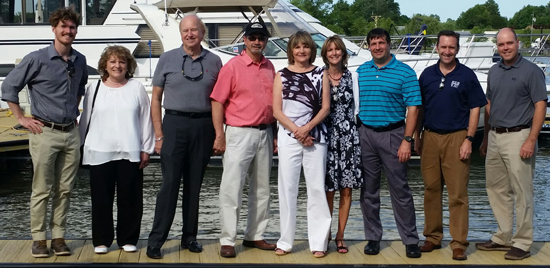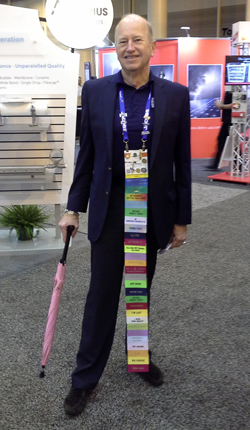The phrase “out of sight, out of mind” might accurately describe the perception many people have of the water and waste water treatment industry. For Carl Janson, however, it’s exactly the opposite. For the president of Riordan Materials Corporation, water and wastewater treatment are a constant in his life and in the life of his independent rep agency.
The Blue Bell, Pennsylvania-headquartered Riordan Materials Corporation puts forth the following goal in its mission statement: “Our mission is to provide quality, cost-effective solutions for our clients, while providing the best technical support services available before, during, and after installation. We are proud to represent the premiere line of products for water treatment, wastewater treatment, odor control, solids handling, pumping, and biosolids processes. Our history of consultative sales, combined with our outstanding platform of equipment, provide you the best alternatives available.” According to Janson, he and his team have fulfilled that goal over the course of the agency’s history.
While Riordan Materials’ history (a brief version of which accompanies this article) goes back more than 66 years, Janson traces his involvement with the agency to 1984. As an environmental science/biology major out of college, Janson began his career as an applications engineer on the manufacturing side. That beginning evolved into sales engineering and marketing. “When I was working with the manufacturer in the sales capacity, I was traveling about 60 percent of the time. One week I’d take the blue suit and then the next week the brown one. The travel was getting to be a bit much.”
It was at that point when their local rep contacted him about going into business as a rep. “If I had made the move at that time, it would have been a serious financial hit. As a result, I pushed back on making a decision.” A short time later when a death at the agency occurred, he was contacted again. “I let them know of my interest in owning the business and said I’d only pursue it if that opportunity existed.” And, that’s exactly what happened.
Making the Move
While taking a major hit when it came to salary (about 40 percent) and bonuses, he made the move. “I knew that the manufacturer I was working with was selling through reps and there was a good deal of potential given the projects we had going on. I believed I had a real future with the firm. I joined them as a sales rep and over the course of a year and a half we finalized the purchase plans for the agency, which were completed by 1989.”
Janson was hardly unprepared to begin life as an independent rep. “I had worked with and traveled with reps in my previous positions. I recognized the fact that reps had to be dedicated to their profession to be successful and that a rep’s life was hardly the typical 8 a.m. to 5 p.m. existence. I also appreciated the fact that reps are hardly compensated out of a manufacturer’s profits; rather it’s simply a cost of conducting business. The compensation the rep earns isn’t profit for him, rather it’s how the rep runs his business and pays for his expenses.”
Probably owing to the fact he was familiar with rep operations, Janson admits there were no real surprises for him as he began his rep career but when he’s asked to reflect on any changes that have occurred over his more than 25-year career, however, he’s quick to respond with a “Wow.”

The team at Riordan Materials Corporation (left to right): Michael Wilks, sales engineer; Mariann London, accountant; Carl Janson, president; Tom Schell, past vice president; Anna Marie Damiani, PA office manager; Lori Baroga, MD office manager; August Koloras, PE partner, secretary/treasurer; Arthur Auchenbach, PE partner, vice president; and Thomas Rainier, partner, vice president.
Comparing “Then” to “Now”
Drawing a comparison between then and now, Janson notes that in 1984 “Cell phones were just in their infancy. They were about as heavy as bricks and came with a cumbersome battery pack. You were lucky if you got two hours out of them. On top of that they were very expensive to use. When you looked at it, using the cell phone was a last resort. Most of us depended on using a pay phone and once you located one you had to make sure there were no competitive reps around to overhear your conversation. Compare that to today when all of us use cell phones, e-mail and texts.”
Then came the fax machine. “I was a bit of a ‘tech guru’ back then and I felt we had to have a fax machine. The head of the agency argued against that and said if we didn’t receive something via mail, it wasn’t worthwhile. I argued that we had to have a fax machine and that in the long run it would save us money. I finally convinced him and we took delivery. Back then fax machines only used thermal paper. We’d receive a fax and then file the paperwork away. After a period of time, we’d access the fax but found we couldn’t read them—the printing had faded or disappeared completely. As a result, we then began copying faxes when we received them. It couldn’t have been more inefficient. Compare that to today when we’re so dependent on e‑mail and text messages.”
Just an as any rep will agree, times have changed and Janson notes that today “Customers and principals want an answer in a hurry — they’re not going to wait for the mail or fax communication. I can’t count the times when I get a call at 8 a.m. from someone wanting an answer to a text or e-mail they had sent me earlier that morning.”
Today, properly armed with the latest means of communication, cell phones, computers, CRM, etc., Riordan Materials Corporation has nine employees, five of whom toil on the sales side. Janson explains that he’s been in the enviable position of not having any difficulty in growing the agency and having to fill too many vacant employee slots over the years. Likewise with finding prospective principals, he explains that “Basically we’ve been able to find principals via word of mouth from other principals and customers. When one of our customers is alerted to the fact their manufacturer is looking for new representation, they’ll recommend us. In addition, we attend industry trade shows both here and in Europe.” When it comes to representing overseas manufacturers, he explains, “While some of their expectations are different from domestic principals, overall the experience has been positive. Since Europe is a much more condensed geographical area than the United States and they are much more used to selling direct, they can sometimes have different expectations when it comes to working with reps. Language has certainly never been a problem since Swedish, German and Japanese companies we’ve dealt with are all fluent in English.”
Recognizing Concerns

One project that Riordan Materials Corporation worked long and hard on was the Gloucester County Utilities Authority, NJ CB&I/McDermott Egg Shaped Digester project. According to Janson, “At $17.5-million, this is the largest order to date that our company has ever received. I secured the order after working more than three years on this project.”
If there are no pressing concerns when it comes to finding new personnel or dealing with principals, that doesn’t mean there aren’t some things that get his attention. Janson explains, “Cash flow is always a concern, since not all contractors pay quickly. On top of that, we’ve got to make sure the pipeline is constantly filled with projects. Then, just as any other rep firm, we have to contend with the possibility of losing a line or having a new principal acquire one of our lines, thereby creating a conflict. On a more personal note, it’s always important to us to make sure we recognize the contributions of our staff and make sure the public is aware of the importance of water and wastewater treatment.”
On that last point, he notes that “This is especially important. I’m not sure I ever thought I’d be paying $1.50 for a bottle of water without even thinking about it. But, when the public complains when they receive a water bill of $150, they’ve got to understand how important water and wastewater treatment is in their lives.”
Finally, as a 44-year member of MANA, Janson noted how important association membership has been for his agency. “The agency’s previous president was a major proponent of MANA membership. After I joined the company, I got involved in its Philadelphia chapter, served on the MANA advisory council and participated in seminars over the years. In addition, I’ve regularly made it a habit to distribute articles to our sales staff that appear in Agency Sales.”
The Riordan Materials Corporation File
- Location: Blue Bell, Pennsylvania
- Founded: 1953
- Joined MANA: 1974
- Personnel: Nine, five of whom are salespeople
- Branch Locations: Crofton, MD; Reading, PA; Allentown, PA
- Territory Covered: Central E. PA, Central S. NJ, DE, MD, VA, DC
- History: Riordan Materials Corporation was formed by John Riordan in 1953. Its sister company, Industrial Materials, had been founded six years earlier and was the active firm. In 1967, the company entered the growing wastewater purification process equipment field. Riordan made this move because different methods were necessary to market this equipment to a higher-caliber technology group consisting of consulting engineers, municipal operating personnel and industrial environmental engineers. The company presently employs nine people providing high-quality equipment, service and technical support for any water and wastewater project.
MANA welcomes your comments on this article. Write to us at [email protected].


